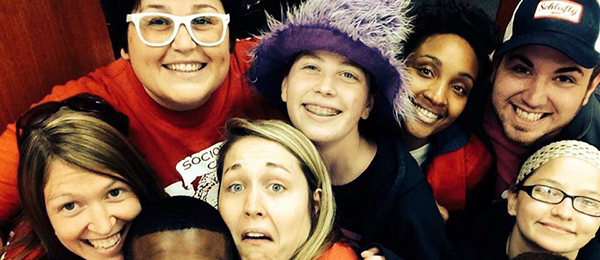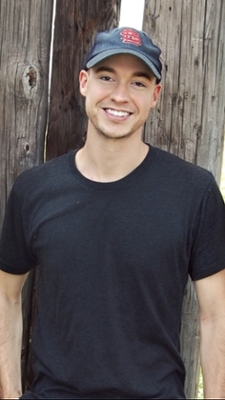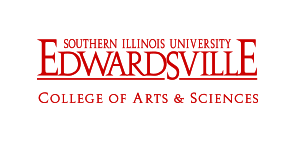|
|
|
The Sociology Program invites you to see....
|
|
|
|
What's New Around the Department
|
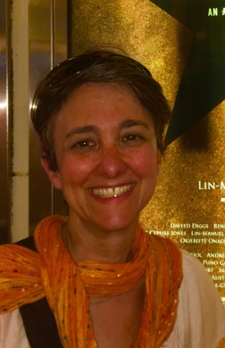 |
|
|
Since our last newsletter, the state of Illinois budget crisis continues. For SIUE, this means challenging economic times. The truth is, it’s a difficult time to be at a public school or university. Nationally and regionally, we see political statements that education is valued, but then legislators appear to be unwilling to back proposals to fund the educational costs for k-12 and higher ed.
What’s frustrating is that the U.S. is the wealthiest country in the world, owning 41 percent of the world’s wealth. Yet, we also have tremendous inequality. In fact, we have the highest inequality in the world, with a gini coefficient of 80.56 (100 being complete inequality and 0 being no inequality) (Forbes 2015). Our public policy does a great job of ensuring that the concentration of wealth continues, but it's not doing much to decrease inequality by ensuring our children receive quality education.
Meanwhile in the Sociology Program, we are continuing to work hard for our students. We had our first sociology convocation on October 13, bringing alumni and faculty together to speak to our current students. Joe Holt, the alumni featured here, flew in from the east coast to discuss his continued commitment to applying sociology. We met in the Goshen Lounge, shared our passion for sociology and talked about how to turn sociology into a career. It was inspiring to see so much excitement about sociology concentrated in one place. Now that’s a concentration of wealth I can stand behind!
Our Diversity and Social Justice specialization took off this semester, and you’ll see below a brief discussion by Mark Hedley about one of the classes in the specialization: Community Action. We’ve had lots of interest in the specialization so far, and we are sure that the interest will continue.
I heard from some of you after our first newsletter, and it was great to learn how you’re using your sociology degree. I would love to hear more from you so please email me whenever you can.
Enjoy the newsletter!
Dr. Linda Markowitz
Chair, Sociology Program
|
|
|
|
Course Bio: Community Action Class |
|
| |
|
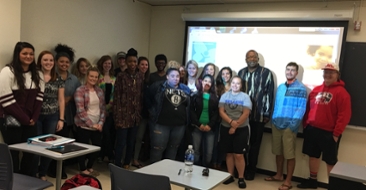
Dr Mark Hedley has been at SIUE since 2001. He has been key at firming up our core offerings, as well as creating some wonderful electives like popular culture, food and society and sexualities. Here he talks about one of the core courses required for students specializing in Diversity and Social Justice: Community Action.
Sociology 325, “The Sociology of Community Action,” offers a sociological approach to the understanding of community organizing within non-profit organizations. The course focuses on organizing “campaigns” ranging from the direct provision of services to identified constituencies to direct political action. It’s an ideal choice for any student interested in pursuing a career in the growing non-profit industry of our economy.
This course is different from most other sociology courses in its focus on service learning and on applied sociology. In terms of service learning, much of the course work expected of students has to do with their participation in a community service project with the Children’s Home and Aid Society of Illinois (CHASI). Last year, the class succeeded in organizing over $9,000 in donations for families sponsored by CHASI’s “Help for the Holidays” campaign. In terms of applied sociology, much of the course credit earned by students in the class has to do with their use of what they learn from course materials in this class project rather than how they perform on quizzes and exams. Instead of a final exam, students complete the class project by documenting, packing up and delivering donations to CHASI.
In the past, students have been very creative at fund raising. Students have given benefit concerts, enlisting their friends to play shows for free or performing themselves. Students have gone to area businesses seeking either funds or donations. They have had bake sales, sales of art or other goods. They have even found a way to get their family and friends involved. Students come into the class nervous about their fund-raising skills, but once they leave, they feel empowered. They gain tremendous confidence in their communication skills, but they also gain confidence in their ability to help others.
|
|
|
Get to Know Our Faculty: Dr. Marv Finkelstein |
|
| |
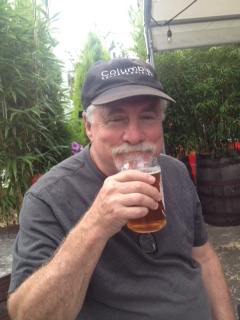 |
|
|
|
1) You’ve been an integral part of the region’s Labor Management Committee for a long time. Can you tell us what that is, and what you’ve done with the group?
I have been involved with the Labor Management Committee of the Leadership Council Southwestern Illinois (LMC) for nearly 30 years. I was executive director of the LMC for 12 of those years. The purpose of the LMC is to foster labor management cooperation in the region. By opening lines of communication and encouraging mutually beneficial relationships between labor and management, we have advanced the economic development of southwestern Illinois. That’s because those who want to invest, start a business or develop a career are more likely to be attracted to work in a community where there is mutual trust and respect. The LMC is composed of labor and management representatives from a variety of private and public organizations, and from all over the region. Its major task has been to raise awareness and build a culture that recognizes cooperation is a viable alternative to the tradition of adversarial relations so prevalent in our region in the 20th century. I have been involved in organizing conferences, meetings, developing educational and training programs, and conducting research that focuses on how labor and management may work together cooperatively to get things done more effectively.
2) SIUE faculty has formed a union association and some people are afraid doing so will create an adversarial relationship between professors and administrators. What are your thoughts about that?
Because the adversarial-conflictual approach has characterized labor relations in the U.S. for so long, there is a lack of understanding and/or willingness to take an alternative path. Everyone is familiar with the idea of fighting the other side to accomplish their goals rather than consider ways to negotiate goals that are mutually beneficial. Today we live in a highly polarized political environment. It takes awareness, education and experience to change in another direction. We usually think of unions and management in construction or an industrial context. But the fastest growing sectors for collective bargaining are in the public sector or service work. At SIUE there have been a variety of unions which have represented different kinds of employees, but this is the first time the faculty has organized. The University holds a lot of promise for cooperative labor relations since it is the kind of place where awareness and education are at the center of its mission and purpose. On the other hand, there are many who either believe that collective bargaining is better suited for “blue-collar” occupations or have just assumed that it automatically translates into an adversarial relationship. We all have a lot to learn, faculty and administrators alike, about how to find common ground when it appears as if all issues must have win-lose results.
3) What is your favorite part of teaching?
My favorite part of teaching is working with students. It’s a lot fun when I can show how sociology provides great insights that not only benefit us personally but also in our careers and professional lives. I love to see how students apply sociology to better understand their family or romantic relationships, or when they provide critical analyses of their jobs and their workplaces. Students want to create a more just society and one that provides better opportunities to people of all backgrounds, and sociology can provide great insight into all these things. It has truly been a privilege to be a part of the learning process at SIUE.
4) What has changed most about your job as professor since you’ve been at SIUE?
SIUE has grown in size and stature since I’ve been here. More students, more buildings, more recognition, more geese and deer! I was here when no one knew or imagined what a cell phone was! On-line teaching has grown so quickly that we must be prepared for rapid and dramatic change in the future. There are revolutions going on right now that are not just technological, but having to do with the diversity of our entire society. Once again we must learn how to find mutually beneficial ways to live and work together.
5) You’ve lived in Webster Groves the entire time you’ve taught as SIUE. What’s that commute like?
It’s National Public Radio Morning Edition in the morning and All Things Considered in the afternoon. When I first got here I used to think the Arch was just a big McDonald's sign. I have grown to appreciate the beauty of the Arch as it always changes at different times of the day, with the weather and the seasons.
6) You’re from New York. Are you used to St. Louis pizza yet?
There is Raconelli’s, but I will never get used to IMO’s.
|
|
|
Graduate Student Showcase: Karlea Lefebvre |
|
| |
|
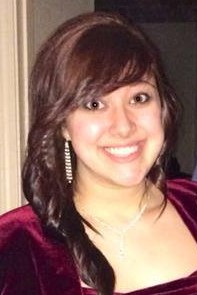 |
|
|
I started attending SIUE in the fall of 2015 after graduating from Truman State University in Kirksville, Mo. There I acquired a Bachelor of Science degree majoring in sociology/anthropology as well as minoring in political communication and justice systems. I am currently in my second year of the Sociology MA degree program, and I am also a graduate teaching assistant for the Sociological Research Workshop and Senior Assignment Seminar courses this semester.
I would say that my strengths as a student lie in quantitative methods, and I enjoy helping colleagues and students with instrument/protocol construction, data collection and statistical analysis. Most of my research interests are spontaneously generated by discourses I encounter in the real world, mostly involving stereotypical assumptions about people who are situated in different life circumstances. I am equally concerned with the passive acceptance of meritocracy in the U.S.; a philosophy I believe is deeply embedded in the concept the American Dream. I have been fascinated by the belief in the American Dream since I started studying sociology and have never run out of new ways to research the questions I have about it.
I am currently in the process of conducting a qualitative research project for my Research Practicum course. For this project, I want to know: How does the framing of welfare policies contribute to the stigmatization of welfare receipt? For this, I will be analyzing how welfare policies are framed historically to determine how public officials define and construct the problem at hand. I want to be able to understand how the messages conveyed in these policies relate to stigmatizing discourses I encounter surrounding welfare receipt. I intend for this project to be a pilot study for my thesis.
|
|
|
Meet Alum: Joe Holt |
|
| |
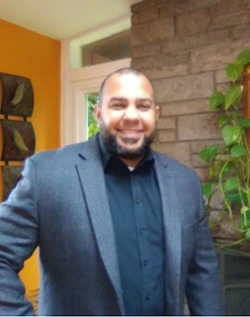 |
|
|
|
I’m a national coordinator for the Service Employees International Union (SIUE), and I use sociology for my career every day. Right now, I’m working on organizing campaigns around the country that try to make life better for every-day people. For example, I’m working with adjunct faculty and the Fight for 15 (new minimum wage laws). But, I’m also active on non-labor issues like immigration reform and Black Lives Matter.
Here’s how sociology is useful. First, believe it or not, I have to understand data and statistics when I’m running a campaign. Second, I also have to understand people and the decisions so that I can help them change their oppressive situations. I do my work in all parts of the country, with people from all types of background, and Sociology has given me the edge.
When I first decided to go into sociology, I was originally looking at the major very instrumentally. I thought, “OK, which discipline will always be in demand?” Sociology as an answer was clear: needing to understand people and the human condition never goes out of style. I decided to further specialize in employment relations because no matter your beliefs, your faith, your race, your gender or sexual preferences, we all have to make a buck. So, understanding labor and the workplace seemed pretty practical.
My mom was a single mother, and we struggled until she got a union job. Unsurprisingly, I studied unions for my undergrad research project. I remember the support and passion from the professors regardless of the topic I chose to study. I was often moved during the lectures and inspired to learn more on my own. I really admired the faculty and that inspiration made me want to get active. In fact, I became the president of the Sociology Club. I admit, I got sort of geeked up about soc.. And I still do.
|
|
|
Senior Showcase: Andrew Kuhnke |
|
| |
We'd like to introduce you to one senior: Andrew Kuhnke. Andrew has been intrigued by the primary debates, especially the two unexpected candidates who did surprisingly well given their lack of support from their respective parties: Donald Trump and Bernie Sanders.
The primary question of my capstone project is: How are non-traditional politicians framing their political discourse? The goal of this project is to provide a better understanding of the changing political and social climates that have led up to and continue to influence the current political cycle. Through a qualitative content analysis of presidential primary debates leading up to the 2016 election, I utilize Erving Goffman’s frame analysis theory to analyze various themes and tactics utilized by non-traditional candidates such as Bernie Sanders and Donald Trump while disseminating their political agendas. It is my hope that this project will help provide insight into our constantly evolving political climate.
|
|
|
Thinking about Sociology: Books You May Enjoy |
|
| |
 |
The New Jim Crow by Michelle Alexander is a stunning account of the rebirth of a caste-like system in the U.S., one that has resulted in millions of African-Americans locked behind bars and then relegated to a permanent second-class status—denied the very rights supposedly won in the Civil Rights Movement. As the U.S. celebrates its “triumph over race” with the election of Barack Obama, the majority of black men in major urban areas are under correctional control or saddled with criminal records for life. Jim Crow laws were wiped off the books decades ago, but today an extraordinary percentage of the African-American community is warehoused in prisons or trapped in a parallel social universe, denied basic civil and human rights—including the right to vote; the right to serve on juries; and the right to be free of legal discrimination in employment, housing, access to education and public benefits." |
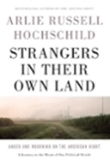 |
Strangers in Their Own Land by Arlie Hochschild goes beyond the commonplace liberal idea that many on the political right have been duped into voting against their interests. In the right-wing world she explores, Hochschild discovers powerful forces—fear of cultural eclipse, economic decline, perceived government betrayal—which override self-interest, as progressives see it, and help explain the emotional appeal of a candidate like Donald Trump. Hochschild draws on her expert knowledge of the sociology of emotion to help us understand what it feels like to live in “red” America. Along the way she finds answers to one of the crucial questions of contemporary American politics: why do the people who would seem to benefit most from “liberal” government intervention abhor the very idea?" |
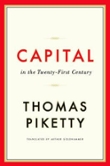 |
In Capital, Piketty shows that modern economic growth and the diffusion of knowledge have allowed us to avoid inequalities on the apocalyptic scale predicted by Karl Marx. But we have not modified the deep structures of capital and inequality as much as we thought in the optimistic decades following World War II. The main driver of inequality—the tendency of returns on capital to exceed the rate of economic growth—today threatens to generate extreme inequalities that stir discontent and undermine democratic values. But economic trends are not acts of God. Political action has curbed dangerous inequalities in the past, Piketty says, and may do so again. |
|
|
|
|
